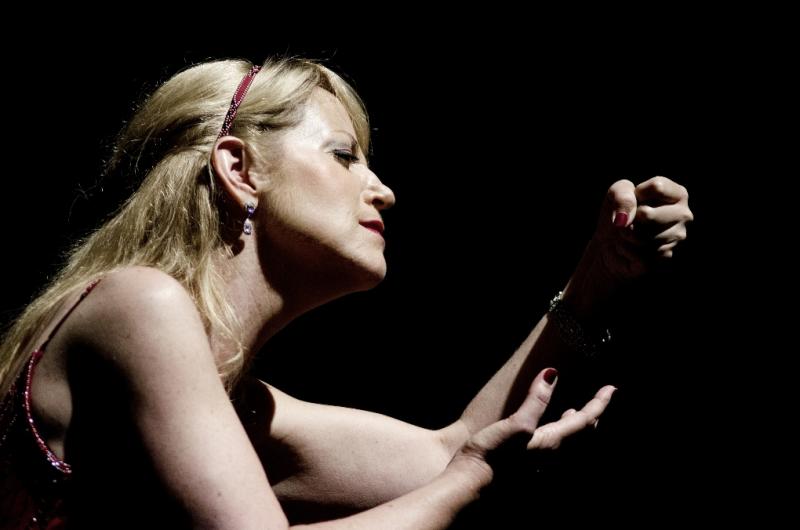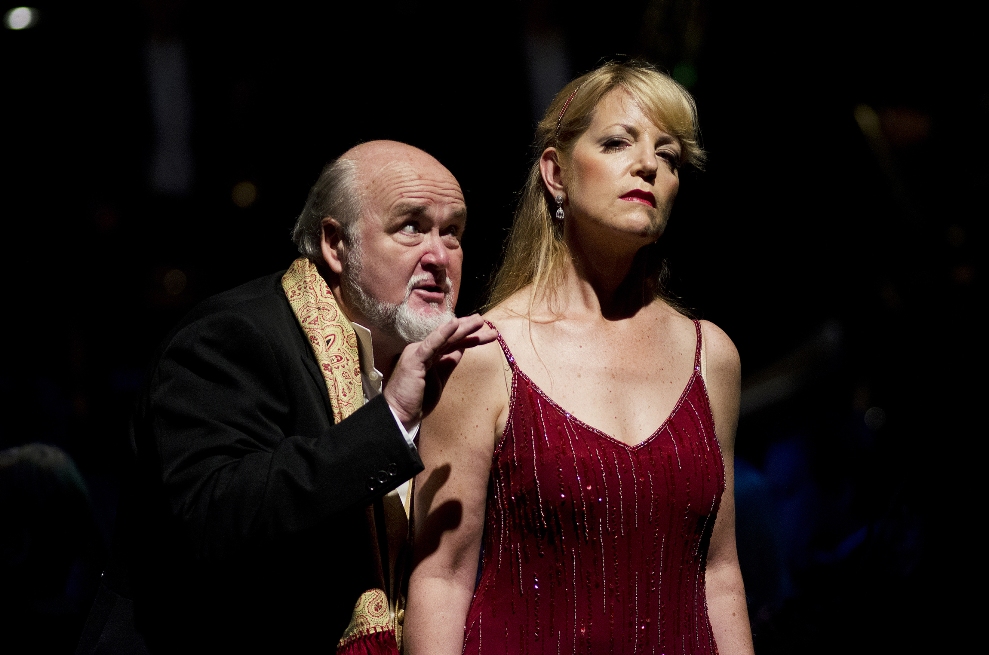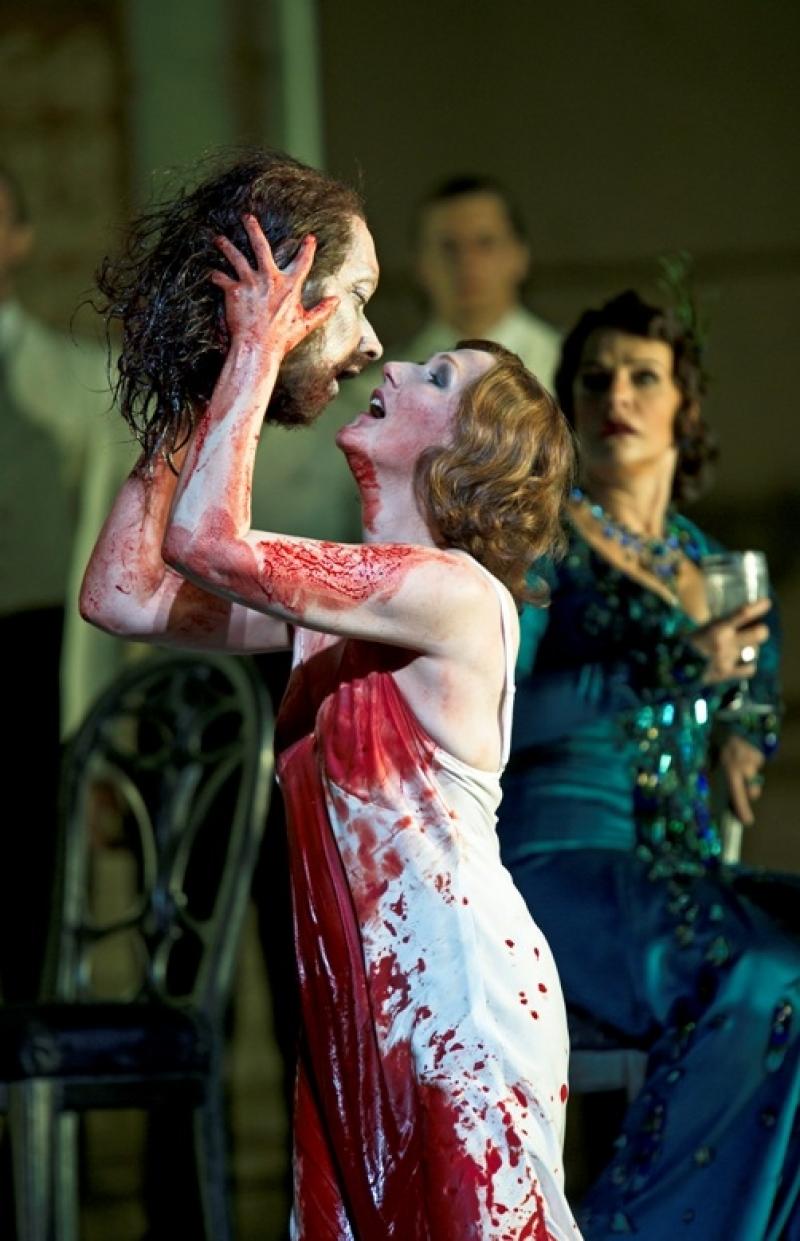Salome, Bournemouth SO, Karabits, Symphony Hall, Birmingham | reviews, news & interviews
Salome, Bournemouth SO, Karabits, Symphony Hall, Birmingham
Salome, Bournemouth SO, Karabits, Symphony Hall, Birmingham
Lise Lindstrom steals the show as a sensual Strauss anti-heroine in concert

“How fair is the Princess Salome tonight”! That slithering clarinet run, that glint of moonlight: few operas create their world so instantly and so intoxicatingly. At Symphony Hall, the lights rose on the very back row of the stage, the percussion riser serving as the terrace from which Andrew Staples’s Narraboth and Anna Burford’s Page exchanged their ecstasies and warnings.
Lindstrom seemed to pull the drama in around her in every scene in which she appeared. She stalked the platform, her movements calculated and taut, her eyes wary: Salome as wounded predator. Her tone wasn’t especially lush. What her voice had in abundance was focus and a sort of concentrated sensuality, just as potent and expressive whether hurling soaring arcs of sound at the back of the hall, or whispering a lethal threat. In the space of the one phrase “Gib mir den Kopf des Jokanaan” (“Give me the head of John the Baptist”, it modulated from luminous sweetness to a curdled snarl; and then again, and again - changing from sinister to savage as the Princess repeated her demand.
Around a figure as compelling as Lindstrom, the limitations of the concert format hardly seemed to matter. Joe Austin directed, making effective use of basic coloured lighting and a few telling details of characterisation – James Rutherford’s hellfire-preacher hand gestures and blustering delivery as Jokanaan, Kim Begley’s self-satisfied manspreading as Herod – to lift this performance away from stand-and-deliver. Begley was very nearly as watchable as Lindstrom (the two pictured below). His wiry tenor fits Strauss’s brutal writing as comfortably as anyone’s ever could. He strutted complacently about the stage, eyes glinting with lust: a gloriously sleazy Tetrarch and – for once – a plausible match for Herodias. Birgit Remmert sang with such lustre in that role that at times she almost made her character seem likeable – then banished any thoughts of sympathy with the hissing malice of her low notes, as Salome pressed home her appalling final demand.
 The BSO played as if they were loving every single note – as well they might. Initially, there were balance problems (Staples and Burford were almost inaudible at times), and a tendency for the richer textures to become congested – both familiar issues when guest orchestras overcompensate for the Symphony Hall acoustic.
The BSO played as if they were loving every single note – as well they might. Initially, there were balance problems (Staples and Burford were almost inaudible at times), and a tendency for the richer textures to become congested – both familiar issues when guest orchestras overcompensate for the Symphony Hall acoustic.
Karabits quickly got that under control, and then let his team play out: a firm, satin-finished string section (the decision to split the violins revealed some usually unheard details), exuberantly characterful woodwinds and a tuba player who deserved a solo bow in his own right.
This wasn’t a particularly refined Salome, but it was a dazzlingly colourful one. Karabits seemed to take an almost tactile pleasure in a trumpet’s peacock-squawk or the blinged-up glitter of celeste and harp. And the way he handled the sweep of Strauss’s final sequence, pushing headlong into Salome’s dance, and letting the ensemble run off the leash as Strauss’s harmonies strain ever closer to collapse – well, for drama, no concert performance can ever be an adequate substitute for a full staging. But this came damned close.
MORE RICHARD STRAUSS ON THEARTSDESK
Der Rosenkavalier, Royal Opera (2009). Uneven revival of John Schlesinger’s 25-year-old production
Capriccio, Grange Park Opera (2010). Lively staging, stylish singing and a welcome intrusion of wartime reality
Salome, Royal Opera (2010). Angela Denoke's mercurial Salome (pictured below by Clive Barda) shimmers in Strauss's monstrously beautiful opera
Ariadne auf Naxos, Welsh National Opera (2010). Hoffmansthal's libretto is all about fidelity. This updating is faithful, up to a point
 Intermezzo, Scottish Opera (2011). Soprano Anita Bader graces a Klimtian take on Richard Strauss's domestic comedy
Intermezzo, Scottish Opera (2011). Soprano Anita Bader graces a Klimtian take on Richard Strauss's domestic comedy
Die Frau ohne Schatten, Mariinsky Opera (2011). Strauss's massive fairy tale makes a rare outing in Gergiev’s musically strong venture at the Edinburgh Festival
Der Rosenkavalier, English National Opera (2012). David McVicar and Edward Gardner deliver a riveting account of Strauss's popular opera with Amanda Roocroft as the Marschallin
Intermezzo, Buxton Festival (2012). Fine style in Strauss's comedy-with-feeling
Ariadne auf Naxos, Glyndebourne Festival Opera (2013). Strauss's opera reluctantly enters the Battle of Britain courtesy of a young German director
Capriccio, Royal Opera (2013). Renée Fleming leads superlative cast in concert performance of Strauss's operatic debate
Elektra, Royal Opera (2013). Revival with Christine Goerke in the title role hits the horrid heart of the matter in Strauss's poleaxing masterpiece
Die Frau ohne Schatten, Royal Opera (2014). Compelling dream-interpretation of Strauss's myth graced by fine singing and Semyon Bychkov’s conducting
Der Rosenkavalier, Glyndebourne (2014). Richard Jones finds new order in rococo comedy for music, with Kate Royal as the Marschallin
Salome, BBC Proms (2014). Nina Stemme stuns with Donald Runnicles and the Deutsche Oper Berlin in a giddying account of Strauss's incredible score at the Proms
Ariadne auf Naxos, Royal Opera (2014). Two nymphs are the real revelation in this revival of evergreen hybrid
Der Rosenkavalier, Royal Opera (2016). Robert Carsen's handsome production with Renée Fleming is elevated by superb orchestral playing
The future of Arts Journalism
You can stop theartsdesk.com closing!
We urgently need financing to survive. Our fundraising drive has thus far raised £49,000 but we need to reach £100,000 or we will be forced to close. Please contribute here: https://gofund.me/c3f6033d
And if you can forward this information to anyone who might assist, we’d be grateful.

Subscribe to theartsdesk.com
Thank you for continuing to read our work on theartsdesk.com. For unlimited access to every article in its entirety, including our archive of more than 15,000 pieces, we're asking for £5 per month or £40 per year. We feel it's a very good deal, and hope you do too.
To take a subscription now simply click here.
And if you're looking for that extra gift for a friend or family member, why not treat them to a theartsdesk.com gift subscription?
more Opera
 The Makropulos Case, Royal Opera - pointless feminist complications
Katie Mitchell sucks the strangeness from Janáček’s clash of legalese and eternal life
The Makropulos Case, Royal Opera - pointless feminist complications
Katie Mitchell sucks the strangeness from Janáček’s clash of legalese and eternal life
 First Person: Kerem Hasan on the transformative experience of conducting Jake Heggie's 'Dead Man Walking'
English National Opera's production of a 21st century milestone has been a tough journey
First Person: Kerem Hasan on the transformative experience of conducting Jake Heggie's 'Dead Man Walking'
English National Opera's production of a 21st century milestone has been a tough journey
 Madama Butterfly, Irish National Opera review - visual and vocal wings, earthbound soul
Celine Byrne sings gorgeously but doesn’t round out a great operatic character study
Madama Butterfly, Irish National Opera review - visual and vocal wings, earthbound soul
Celine Byrne sings gorgeously but doesn’t round out a great operatic character study
 theartsdesk at Wexford Festival Opera 2025 - two strong productions, mostly fine casting, and a star is born
Four operas and an outstanding lunchtime recital in two days
theartsdesk at Wexford Festival Opera 2025 - two strong productions, mostly fine casting, and a star is born
Four operas and an outstanding lunchtime recital in two days
 The Railway Children, Glyndebourne review - right train, wrong station
Talent-loaded Mark-Anthony Turnage opera excursion heads down a mistaken track
The Railway Children, Glyndebourne review - right train, wrong station
Talent-loaded Mark-Anthony Turnage opera excursion heads down a mistaken track
 La bohème, Opera North review - still young at 32
Love and separation, ecstasy and heartbreak, in masterfully updated Puccini
La bohème, Opera North review - still young at 32
Love and separation, ecstasy and heartbreak, in masterfully updated Puccini
 Albert Herring, English National Opera review - a great comedy with depths fully realised
Britten’s delight was never made for the Coliseum, but it works on its first outing there
Albert Herring, English National Opera review - a great comedy with depths fully realised
Britten’s delight was never made for the Coliseum, but it works on its first outing there
 Carmen, English National Opera review - not quite dangerous
Hopes for Niamh O’Sullivan only partly fulfilled, though much good singing throughout
Carmen, English National Opera review - not quite dangerous
Hopes for Niamh O’Sullivan only partly fulfilled, though much good singing throughout
 Giustino, Linbury Theatre review - a stylish account of a slight opera
Gods, mortals and monsters do battle in Handel's charming drama
Giustino, Linbury Theatre review - a stylish account of a slight opera
Gods, mortals and monsters do battle in Handel's charming drama
 Susanna, Opera North review - hybrid staging of a Handel oratorio
Dance and signing complement outstanding singing in a story of virtue rewarded
Susanna, Opera North review - hybrid staging of a Handel oratorio
Dance and signing complement outstanding singing in a story of virtue rewarded
 Ariodante, Opéra Garnier, Paris review - a blast of Baroque beauty
A near-perfect night at the opera
Ariodante, Opéra Garnier, Paris review - a blast of Baroque beauty
A near-perfect night at the opera
 Cinderella/La Cenerentola, English National Opera review - the truth behind the tinsel
Appealing performances cut through hyperactive stagecraft
Cinderella/La Cenerentola, English National Opera review - the truth behind the tinsel
Appealing performances cut through hyperactive stagecraft

Add comment